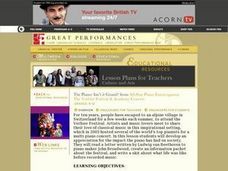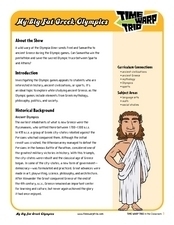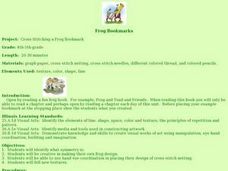Curated OER
Scientific Method
Young scholars conduct an experiment and complete a chart demonstrating some of the basic properties and components of water via the scientific method. They encompass strategies such as questioning, making predictions,...
Curated OER
Biology In Elementary Schools
Students classify animals into six major animal groups and describe the characteristics of the animals found within each group. In this living and non-living animals lesson, students observe a variety of animals, both living and...
Curated OER
Assessing Presenting the Mask
Eighth graders use a software program to recreate a mask they made in art class. Individually, they write a paper describing their mask with an loose illustration. They combine the pictures of each mask into a class book for others to view.
Curated OER
What's So Bad or Good About Conflict?
Young scholars investigate how conflict can be positive or negative. They discuss the concept of conflict while making a class web of their ideas. They design a class bulletin board that includes a thought written by each student after...
Curated OER
The Piano: Isn't it Grand?
High schoolers design an information packet to educate people about the various elements of the Verbier Festival. They construct a skit that exhibits an understanding of the special role the piano played before recording devices were...
Curated OER
Japanese Landscapes
Students study nine watercolor techniques and identify the elements of Japanese landscapes. They design a watercolor landscape using a number of the nine techniques and add contour lines with pen and black India ink.
Curated OER
Wallpaper Pattern
Students identify, explain and use the basic elements of design. They find examples of the four different types of patterns by using wallpaper as their medium. They identify the four different types of pattern and find correct...
Curated OER
Shape & Form
Students analyze the difference between shape and form. They identify, explain and use the basic elements of design and determine that forms are three-dimensional and shapes are two-dimensional. They sketch it on their paper and then...
Curated OER
Critical Reading #2: "The Chase"
In this critical reading worksheet, students read "The Chase" in a designated class period and determine the relevance of the author's life, the general topic, the type of writing, and the theme. Students then summarize the piece and...
Texas Education Agency (TEA)
Byzantine Architecture
View Byzantine architecture from the comfort of your classroom. A PowerPoint presentation introduces important vocabulary terms and examples of Byzantine architecture in the ninth lesson plan of the 11-part series. A Jeopardy game...
Virginia Department of Education
Average Atomic Masses
Facilitate learning by using small objects to teach the principles of atomic mass in your science class. Pupils determine the average mass of varying beans as they perform a series of competitive experiments. They gather data and...
American Institute of Architects
Architecture: It's Elementary!—Fifth Grade
Young citizens construct an understanding of urban planning in this cross-curricular unit. Covering every aspect of city development from the political, economic, and social influences to sustainable building practices, this 10-lesson...
Lunch Lab
Exercise
This is the perfect resource for helping youngsters understand the importance of physical activity in their daily lives. The lesson and its worksheets focus on brainstorming a variety of fitness activities, such as games you can play...
GeorgiaStandards.org
Using Connecting Themes in First Grade Social Studies
Foster contributing members of society with a social studies unit focused on five aspects of community. First graders discuss themes of culture, groups, location, scarcity, and change with discussion questions and activities about...
Time Warp Trio
My Big Fat Greek Olympics
The Olympic Games are indeed a significant and far-reaching cultural component in our international community today, but from where do they originate? Where do our traditions stem from, and how do we choose the sports that constitute...
Curated OER
Create your own Parfleche!
What is a parfleche? It is a box used by the Plains Indians to carry goods as they traveled. First, the class will discuss the uses of these highly ornate boxes and the nature of the Plains Indians' nomadic lifestyle. Then, the class...
Consortium for Ocean Science Exploration and Engagement (COSEE)
Understanding the Food Web
Building on prior knowledge of the pervious lesson in the series, pupils explain the previous lesson to each other. Then they write a simple guide for a young child to read on the same topic.
Annenberg Foundation
Student Voices
Whether it's an election year or not, a unit on voting patterns and political campaigns will awaken the civic pride in your high school citizens. Divided into six parts, the curriculum covers various facets of an election, including...
Curated OER
Cross-Stitching a Frog Bookmark
Pupils identify symmetry and create their own frog design. Students apply hand-eye coordination in placing their designs of cross-stitch netting. Pupils identify with new textures. Students present and analyze their design once finished...
Curated OER
Canadian Olympic Fashion
Pupils, in groups, research a Canadian Olympic sport and design a uniform for a Canadian Olympic team.
Curated OER
"In Like a Lion, Out Like a Lamb"
First graders listen to the story "Cloudy With A Chance of Meatballs" by Judi Barrett. They discuss weather forecasting and create an art project to go with the saying about March weather: "In Like a Lion, Out Like a Lamb".
Curated OER
Cows on Parade
Learners use assorted drawing materials and sheets from a cow shaped pad to create a unique, bright, colorful cows.
Curated OER
Chinese Dragons
Students identify where China is in relation to the US. They investigate the history of dragons in Chinese culture. Students explore the nine different parts of a dragon and incorporate them into their own dragon. Student identify the...
Curated OER
Patterns & Balance
Students compare and contrast the difference in the two sets of images and discuss the visual interest in the first set and the different visual interest created in the second set of prints.

























